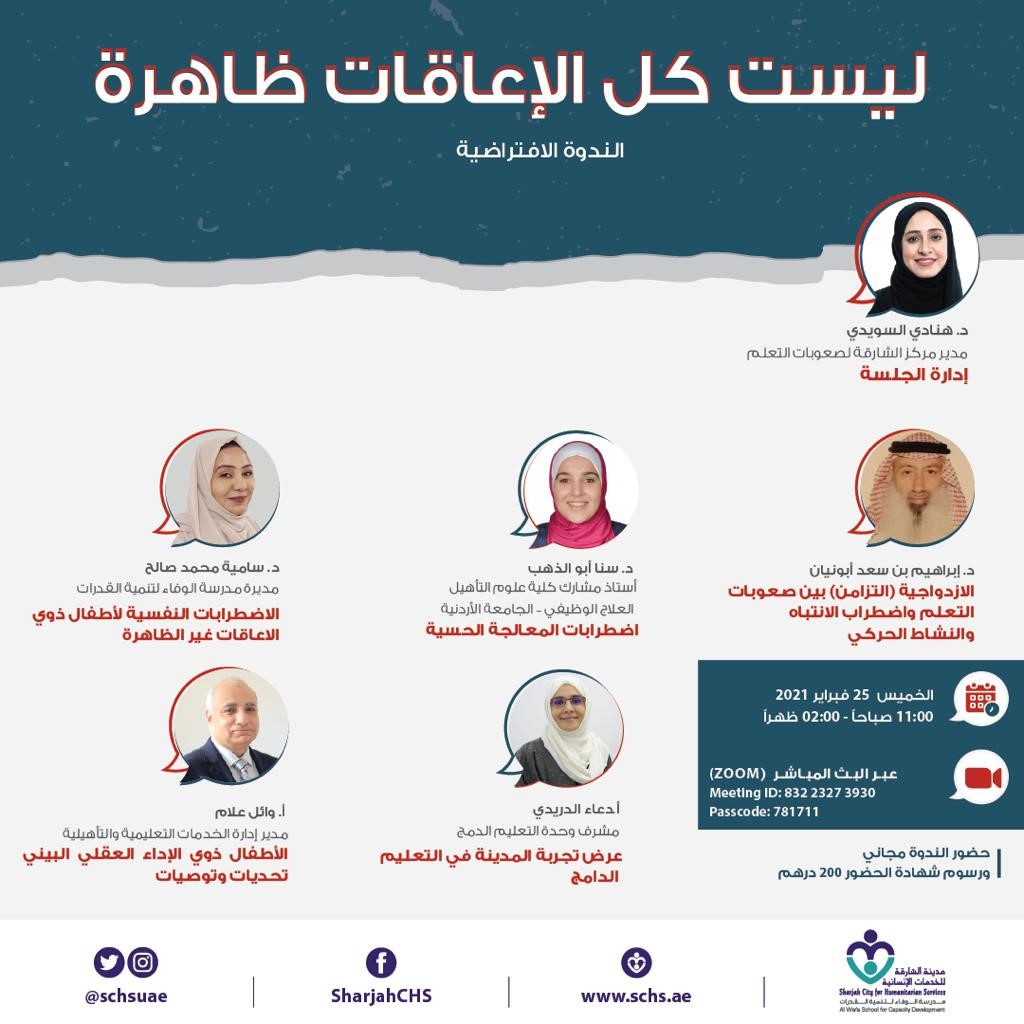
SCHS ORGANIZES “NOT ALL DISABILITIES APPETENT” VIRTUAL LECTURE
Al Wafa School for Capacity Development of Sharjah City for Humanitarian Services (SCHS) launched the activities of the informative campaign to raise awareness of mental disability, which SCHS organizes annually. It aims at spotting light on the latest global practices in the discovery, evaluation and diagnosis of disability. It also emphasizes the promotion of persons with disabilities’ rights, and encourage members of society to discuss their issues.
The campaign this year comes in light of the conditions that the world is experiencing due to COVID 19 under the slogan (Not all disabilities are apparent). It aims at transferring experiences to specialists, parents and teachers to discover hidden disabilities and problems.
The beginning was with the virtual lecture organized by the school (remotely). Dr. Hanadi Al Suwaidi, Director of the Sharjah Center for Learning Difficulties, moderated the lecture organized under the slogan (Not all disabilities are apparent).
More than 375 specialists, parents and public school teachers attended this symposium. Dr. Ibrahim Abunayyan talked through his paper (The Synchronization between Learning Difficulties, Attention Disorder and Hyperactivity) about the possibility of coincidence between learning difficulties, attention disorder and hyperactivity and the percentage of that synchronization.
He also explained the historical relationship between these two disabilities, the similarities and differences in characteristics, and their impact on learning. In addition to the challenges that professionals face due to a double disability, and the considerations that professionals must take when diagnosing and providing services.
Dr. Sana Abu Al-Dhahab, Associate Professor in the College of Rehabilitation Sciences in Occupational Therapy at the University of Jordan, discussed in the symposium a paper entitled (Sensory Processing Disorders). She talked about one of the unseen disabilities, which are sensory processing disorders, and the concept of these disorders, common signs and symptoms, and what professionals should do to help children with sensory disturbances.
For her part, Dr. Samia Muhammad Salih, Director of Al-Wafa School for Capacity Development, focused in her paper entitled (Psychological Disorders for Children with non-Visible Disabilities) on the concept of mental and behavioral disorders and its relationship to challenges and hidden disabilities. She emphasized that these disorders are not a feature associated with those children, but often dealing with these children and not meeting their needs is one of the possible causes of these disorders. She also focused on the possibility of preventing these disorders, which many children and youth around the world face now. She concluded with some recommended interventions.
Mr. Wael Allam, Director of Educational Services Department at SCHS, spoke in a paper entitled (Children with Intermuscular Mental Performance - Challenges - Recommendations) on children with cognitive abilities (intelligence) at the intermediate level. In many cases, people call them children with slow learning.
Allam has confirmed that the people in this group constitute a large minority, according to some researchers. Their percentage may reach about 12 to 14%, with different estimates. Yet they are a category that is not visible to suit its great significance. He pointed out the importance of shedding light on this important group through its determinants and its location in the diagnostic evidence. In addition to pointing out the many challenges that these individuals face, such as the lack of a scientific agreement on the definition, the determinants and the difficulties of early detection.
Ms. Doaa Muhammad Dridi, Supervisor of the Integration Unit in SCHS, talked about in a paper under the title (Presentation of the experience of Sharjah City for Humanitarian Services in Inclusive Education), the concept of inclusive education and the most prominent international and local charters and agreements dealing with inclusive education in the United Arab Emirates. She reviewed the experience of Sharjah City for Humanitarian Services in inclusive education, the general objectives, procedures and services provided in its Inclusive Education Unit. The most prominent achievements, foremost is integrating 527 students with disabilities into public schools during the period from 1995 to 2020.


